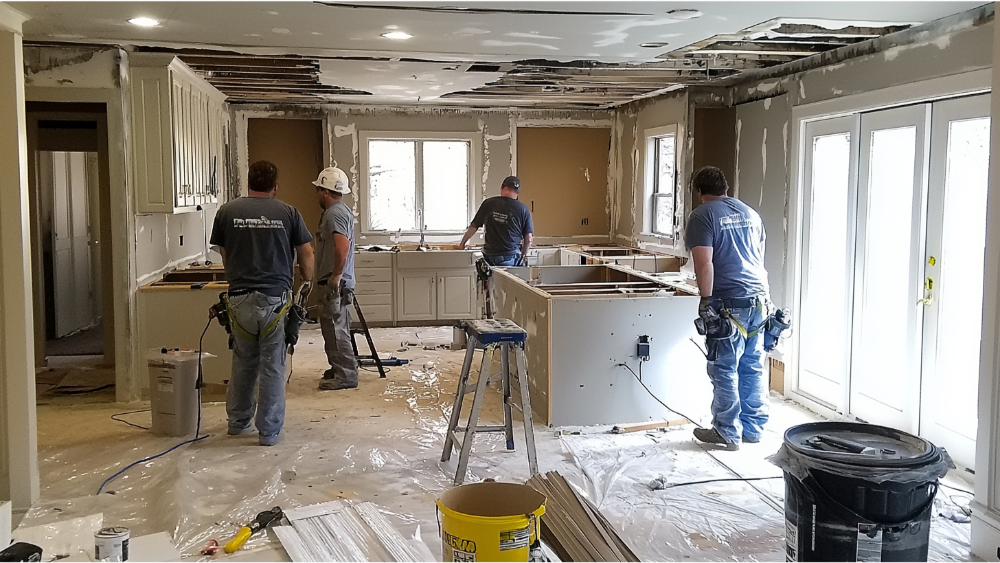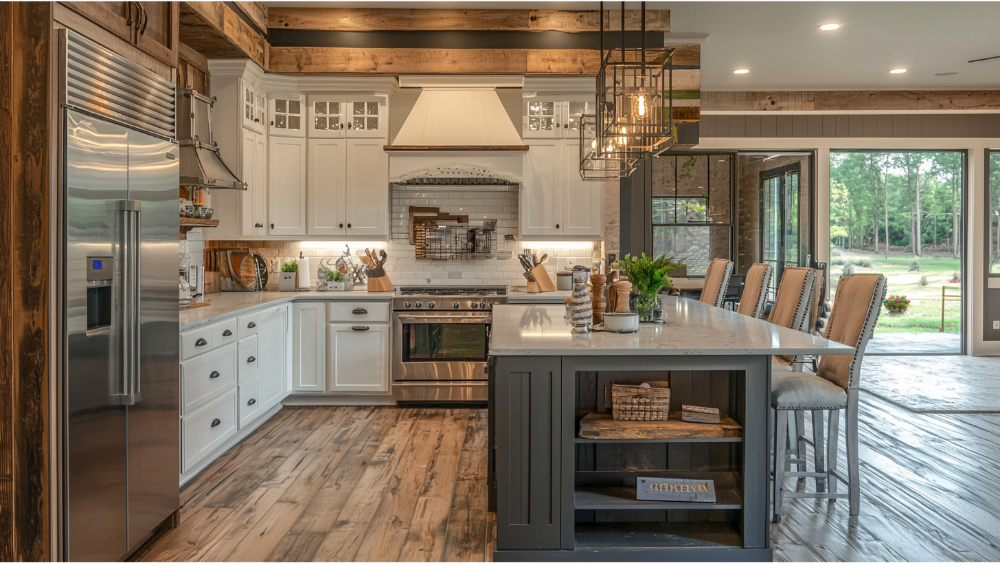
Can You Write Off Home Remodeling? Answered By a Builder
Home remodeling is a popular way to update and improve a home. From kitchen renovations to bathroom remodels, investing in home improvement projects can increase the value of your property and enhance your living space. However, these projects can also be expensive, leading many homeowners to wonder if they can claim a tax break on the costs.
In this article, we will explore whether home remodeling expenses qualify for tax deductions and share insights from a professional builder on which specific expenses might make you eligible for a tax break.
Understanding Home Improvements Tax Deductible
Before diving into the specifics of home remodeling deductions, it's important to understand how a tax-deductible works. A tax deduction reduces the amount of income that is subject to taxation. This means that if you have a $10,000 tax deduction, it will lower your taxable income by $10,000.
Tax deductions are different from tax credits, which directly decrease the amount of taxes owed. Deductions provide more flexibility as they can reduce your taxable income and potentially put you in a lower tax bracket.
Capital Improvements vs. Repairs

When it comes to home remodeling expenses, there is a key distinction that must be made between capital improvement and repairs. Capital improvements are major renovations or additions that increase the value of your property, such as adding a room or completely renovating a kitchen.
On the other hand, repairs are minor fixes or replacements that maintain the current value of your property, such as fixing a leaky faucet or replacing damaged flooring. Generally, only capital improvements can be considered for tax deductions.
Home Improvements and Their Expenses That Can Be Deducted in California
The Internal Revenue Service (IRS) offers tax breaks for certain home improvements that qualify as medical expenses or energy-efficiency upgrades. However, these deductions have specific rules and limitations. These Include:
- Home Office Improvements: If you use part of your home exclusively for business purposes, such as a home office or workshop, you may be able to deduct renovation costs. The space must be used regularly and exclusively for business purposes to qualify.
- Medical Expense: Modifications like wheelchair ramps or widening doorways for accessibility can be tax-deductible if deemed medically necessary. However, these changes must not increase your home’s overall value.
- Energy-Efficient Improvements: California encourages energy-efficient upgrades, such as installing solar panels, geothermal systems, or energy-efficient windows. These improvements may qualify for state and federal tax credits, helping the environment and reducing energy costs.
- Capital Improvement Expenses: Some capital improvement expenses, such as adding a new addition or renovating a bathroom to be more accessible for elderly family members, may qualify for tax deductions. It's always best to consult with a tax professional to determine which expenses are eligible.
Be sure to consult with a tax professional to determine eligibility based on California-specific guidelines.
Expenses That Cannot Be Deducted in California

While some home remodeling expenses may qualify for certain deductions, many are not eligible under California tax laws. These include:
- Personal Use: Renovations made for personal reasons, like upgrading your kitchen or adding a deck, are not tax-deductible.
- Maintenance and Repairs: Routine repairs, such as fixing a leaky roof or replacing broken windows, cannot be deducted from California state taxes.
- Normal Wear and Tear: Expenses for normal upkeep, like repainting walls or replacing old carpeting, do not qualify for tax deductions in California.
- Luxury Upgrades: Any remodeling done for aesthetic or luxury purposes, such as installing a swimming pool or high-end appliances, is not deductible.
- Appliance Replacements: Purchasing or replacing appliances, like refrigerators or washing machines, is considered a personal expense and is not tax-deductible.
- Structural Enhancements: Adding non-essential features, such as a home theater or a wine cellar, does not qualify for deductions.
- Home Office Renovations (Non-Qualifying): If updates to your home office are made for comfort or personal preference, they won't qualify unless they are necessary for business and meet specific IRS criteria.
Skyline Build & Design
Your Partner in Home Improvement and Tax Deductible
At Skyline Build & Design, we are committed to transforming your vision of a dream home into a reality. Based in Sacramento, California, our experienced team specializes in comprehensive home remodeling services, offering a wide range of expertise in renovations, additions, and custom builds. Not only do we provide exceptional craftsmanship and attention to detail, but we also understand the impact of home improvements on your finances.
When it comes to home remodeling and improvement projects, it's important to know which expenses can be tax deductible. Fortunately, there are certain home improvements that may qualify for tax deductions, providing you with potential financial benefits.
Ready to embark on your home remodeling journey? Contact Skyline Build & Design today to explore the endless possibilities of transforming your home while maximizing potential tax deductions.
Frequently Asked Can You Write Off Home Remodeling Questions

Can I deduct the cost of a home renovation if it adds value to my property?
No, any home remodeling expenses that add value to your property cannot be deducted on your taxes. This includes projects that increase the overall market value of your home, such as major kitchen renovations, adding a new room, or building a swimming pool.
However, these expenses may count toward your home's cost basis, which can reduce your capital gains tax when you sell the property. Always review tax laws carefully or consult with a tax expert to understand how these rules apply to your situation.
Is there a limit to the amount of home improvement tax deductions I can claim?
Yes, there are certain limits and restrictions on how much you can deduct for each eligible expense. For example, only home improvements that qualify as medical necessity, such as installing wheelchair ramps or modifying bathrooms, may be deductible immediately as medical expenses.
Other types of improvements may only become deductible if they are part of a home office or rental property. It’s essential to consult with a tax professional or accountant to ensure you are adhering to IRS guidelines and maximizing the benefits available to you.
Do I need to keep records of my home remodeling expenses for tax purposes?
Yes, it's crucial to keep detailed records and receipts of all home remodeling expenses for at least three years after filing your taxes. This includes invoices, contracts, and proof of payment to document the work done.
These records not only support any deductions or tax credit claimed on your tax return but also help establish the cost basis of your home, which is essential when calculating taxes on a future sale.
For significant renovations, maintaining before-and-after photos can also be helpful in substantiating your claims. Keeping organized records now can save you time, money, and headaches later.
Conclusion

While it may be tempting to write off your entire home remodeling project on your taxes, it's important to understand the specific guidelines and eligibility requirements set by the IRS and your state. By consulting with a tax professional and doing your research, you can determine if any of your remodeling expenses qualify for deductions.
At Skyline Build and Design, we’re here to help! Not only can we assist you in creating your dream home, but we can also guide you in understanding which upgrades might offer potential tax benefits. Every bit helps when it comes to reducing your taxable income and keeping more money in your pocket.
Ready to start your remodeling journey? Contact Skyline Build and Design today! Happy remodeling!
Disclaimer
The information provided in this article is for informational purposes only and should not be considered legal or financial advice. Please consult with a qualified tax professional or accountant before making any decisions.




